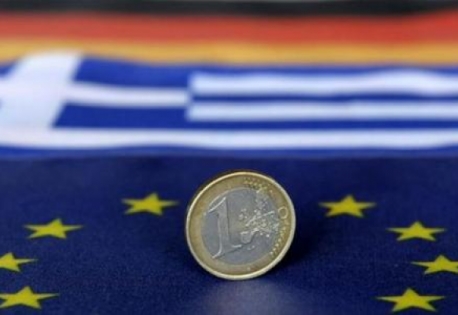By Tim Worstall, Forbes
It’s New Year’s Day so time to prognosticate, forecast and plain ol’ jus’ tell everyone what we hope for.
And my big hope, the big wish, for 2015 is that the upcoming Greek election will end up smashing the euro as a viable currency covering much of the European Union. I will admit that I am hugely biased upon this subject, thinking that the European Union itself is a bad idea and the euro, as currently constituted, is an even worse one. I don’t think that either should exist in fact: which does, I assure you, mark me out as being something of an extremist. However, now that you know that you can weigh my bias as you wish in what follows.
The basic economic insight we need is the optimum currency area. Really explored by Robert Mundell (who got the Nobel in 1999, just before the launch of the euro, something that should give many pause for thought) the basic thought is that, as with so much in economics, there is actually no solution. There’s only a series of tradeoffs. Sure, there are benefits to everyone using the same currency: lower transactions costs leading to larger trading areas and thus greater general efficiency in the economy say. There’s also disbenefits: sharing a currency will mean that different areas will need to have the same monetary policy as well. And there are times when this is a seriously bad idea. In some areas the benefits will outweigh the costs: in others, the problems the benefits. This is obviously an ever changing feast as well, as communications methods, technologies, trading patterns change and so on.
One general rule is that the larger the area the less likely it is to be an optimal currency area. The second is that the more variable the economies within it the less so. And the third that is is possible to increase the size of the optimal area by having political and fiscal unity across the entire area.
This was all looked into in the late 1990s as the euro came into being. And it was (and usually still is) generally accepted that Germany and the Benelux countries (Holland, Belgium and Luxembourg) probably did make up an optimal currency area. Switzerland and Liechtenstein obviously are. It’s probably not true that the UK is: the effects of interest rate changes are so wildly different upon the manufacturing industry of the Midlands and the North as opposed to the service industries of London and the South that despite the fact that it has been a currency area for centuries now it’s still probably not an optimal one. Various people noted that it’s only in recent decades that it could be said that the US is an optimal currency area: and it’s not overly mischievous to point out that the Great Crash of real estate prices was exactly such a shock because prices right across the country had never been coordinated in that manner before. That prices react the same way at the same time is one of those things that shows you might be an optimal currency area.
It was also generally accepted that Greece most certainly shouldn’t be in this new euro, Italy probably not (nor Spain and Portugal) and there were serious concerns about whether France should be or not. All of that economics went out of the window of course in the rush of political enthusiasm for “building Europe” and so we ended up with countries that definitely shouldn’t have been in the euro being in it.
And it’s exactly this that has caused so much economic pain in Greece, Spain, is about to cause it in Italy and possibly even France. As Milton Friedman pointed out the problem is going to come the first time there is some external event that affects the different constituent parts differently. And we saw that only a few years after introduction too. Germany was having a bad time of it so interest rates were set low for the benefit of the German economy. This set off vast property speculation bubbles in Ireland and Spain as a result of those interest rates being too low for their domestic economy circumstances. Then, as always happens, came the bust. And it’s here that places like Greece got caught.
So, at this point Greece is without the usual policy tools and the only way that it can deal with things is to enforce grinding deflation upon the Greek economy. There’s a series of charts here that show what that means.
Vast, horrendous, economic pain inflicted for no good reason. On a couple of accounts. The first being that if Greece wasn’t in the euro then it would have devalued and while not everything would be peachy there would still be something close to full employment and much pain would have been avoided. It’s also true that if the EU had full political and economic union then there would have been transfers from richer areas to poorer like Greece. In much the same manner that Federal spending in the US mitigates (or perhaps will mitigate in the case of Texas as the oil boom comes to an end) the effects of economic disaster upon any one state in the union. And finally much of this pain could have been avoided if the ECB had taken note, as the Federal Reserve and Bank of England did, of the mistakes made in the 1930s. Instead of enforcing that crushing deflation, why not run an unorthodox and expansionary monetary policy (QE and such)? Sadly the ECB is firmly under the thumb of the Bundesbank and their ordomonetarism, a real throwback to the 1930s. Entirely ignorant both of Keynes and also of Friedman on the defects of the Fed’s actions in those years. To disagree with one or the other of them is one thing, but to reject both is, well, actually, it’s uniquely Germanic in this modern world.
So, my point is that the euro itself is a bad idea (and as above, I’m pretty down on the idea of the EU itself too). It’s not just that it’s not an optimal currency area, it’s that it also doesn’t have that economic and political union which would push it closer to being one (and that union isn’t something I want to see anyway) and further, it’s actually ruled by people with monetary policy ideas that are 80 years and more out of date. So, let’s look forward to it breaking up.
And that long introduction leads us to the current Greek situation. There’s an election just coming up and it’s likely (not certain, but likely) that Syriza will win it. This is one of the new very definitely left of centre parties in Europe and they’ve quite clearly said that they’re just not going to put up with this austerity any more. That austerity being the polite name for the enforced deflation being imposed upon Greece.
They’ve said that they don’t want to leave the euro itself: but that’s not consistent with the other things they want to do. Like repudiate large parts of the debt owed to banks and people in other countries for example. There’s debate around on whether the EU, the ECB or, if we’re honest about it the power brokers, the Germans, want them to stay or to go. Even at the same newspaper we’ve got pundits saying that if they do go then that will be end the of it, or perhaps the unraveling of the entire euro project.
My own reading of it is, well, I’m afraid that I can’t provide a great deal of support for it, only some suppositions. And I start with the idea that most of the people involved in all of this have absolutely no clue whatsoever what they are doing. Obviously the Bundesbank and the ECB don’t otherwise monetary policy these past few years would not have been so appalling. Most European politicians wouldn’t know an economic concept even if you waved a wad of banknotes at them. And of course the leftist romantics in Syriza have very little clue about economics: if they did they wouldn’t be leftist romantics. So, my expectation is that a combination of the clueless and the ill-informed will stumble into doing exactly what they profess they don’t want: getting Greece out of the euro.
My expectation of the mechanism is that the Greeks will say the debt has to be cut, the ECB (and Bundesbank) will insist that the course has to be kept, Greece will then repudiate the debt and the ECB will cut off funding to the Greek banks. At which point the only possibility for Greece is to bring back the drachma to recapitalise those banks and keep the economy open. This can actually be done, it would be shocking and chaotic, but it can be done for it has been done before in the past in other places.
It’s what happens next that will be truly interesting. There would, undoubtedly, be a further crash in the Greek economy. Perhaps another 20% of GDP, something of that order. No one would look forward to that at all. But what then?
There’s really two possibilities. The first is a deep and short depression/recession like that of 1921 in the US. 18 months later it was all done with and the economy roared on for near a decade as the Roaring Twenties. The other is a prolonged Depression like the US in the 1930s. Which is what Greece is currently suffering of course (actually, by most measures, Greece now is doing worse than the US did in the 30s). I would plump for the 1921 experience. On the grounds that what went wrong in the 1930s was the monetary policies of the Fed (as Ben Bernanke agrees), not the actual crash of 1929 itself. With an appropriate monetary policy, as a newly currency independent Greece would have, the bounce back would be swift.
Which would bring us on to the other countries currently being strangled by membership of the euro. Spain seems to have come through the other side of the necessary structural adjustments, as does Ireland. It’s been horribly painful but they do seem to have got there. But Italy and France are teetering on the edge of public debt spirals, they can’t change their monetary or currency policies, they can’t even try Keynesian reflation. So, my guess is (and we’re not at the end of such a chain of supposition that this is a guess) that if Greece did leave and then bounce, then there would be discrete preparations in both countries for the abandonment of the euro.
At which point of course the experiment is dead and with it the idea of ever closer union within the European Union. That last being my desired goal of course.
Yes, of course this is all hugely speculative. But I can see it as being a possible path in this coming year. Syriza wins, they try to negotiate on the debt and austerity and find the only viable option is to leave the euro. It works, others leave and there we are, free of it. It won’t be pretty and it won’t be nice but it is something to hope for on this New Year’s Day. The end of the most appalling economic experiment of my adult lifetime (the worst one of my entire lifetime was of course communism but that only just lasted until I was roughly adult).



















